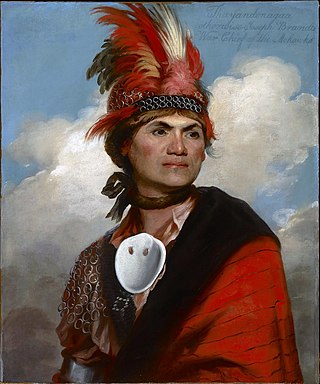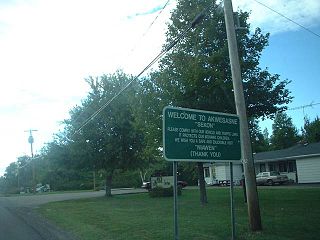Mohawk Girls may refer to:
- Mohawk Girls (film), a 2005 documentary
- Mohawk Girls (TV series), a 2014 series based on the film
Mohawk Girls may refer to:
Champ is the short form of champion.
Mohawk may refer to:

Mohawk is an Iroquoian language currently spoken by around 3,500 people of the Mohawk nation, located primarily in current or former Haudenosaunee territories, predominately Canada, and to a lesser extent in the United States. The word "Mohawk" is an exonym. In the Mohawk language, the people say that they are from Kanien:ke and that they are Kanienʼkehá꞉ka "People of the Flint Stone Place" or "People of the Flint Nation".

The Mohawk people are the most easterly section of the Haudenosaunee, or Iroquois Confederacy. They are an Iroquoian-speaking Indigenous people of North America, with communities in southeastern Canada and northern New York State, primarily around Lake Ontario and the St. Lawrence River. As one of the five original members of the Iroquois League, the Mohawk are known as the Keepers of the Eastern Door – the traditional guardians of the Iroquois Confederation against invasions from the east.
The Oka Crisis, also known as the Kanehsatà:ke Resistance, was a land dispute between a group of Mohawk people and the town of Oka, Quebec, Canada, which began on July 11, 1990, and lasted 78 days until September 26, 1990, with two fatalities. The dispute was the first well-publicized violent conflict between First Nations and provincial governments in the late 20th century.

The Kahnawake Mohawk Territory is a First Nations reserve of the Mohawks of Kahnawá:ke on the south shore of the Saint Lawrence River in Quebec, Canada, across from Montreal. Established by French Canadians in 1719 as a Jesuit mission, it has also been known as Seigneury Sault du St-Louis, and Caughnawaga. There are 17 European spelling variations of the Mohawk Kahnawake.

The Mohawk Nation at Akwesasne is a Mohawk Nation (Kanienʼkehá:ka) territory that straddles the intersection of international borders and provincial boundaries on both banks of the St. Lawrence River. Although divided by an international border, the residents consider themselves to be one community. They maintain separate police forces due to jurisdictional issues and national laws.

Gremlins 2: The New Batch is a 1990 American comedy horror film, and the sequel to the 1984 film Gremlins. It was directed by Joe Dante and written by Charles S. Haas, with creature designs by Rick Baker. Zach Galligan, Phoebe Cates, Dick Miller, Jackie Joseph, and Keye Luke reprise their roles from the first film; Belinda Balaski also returns, this time playing a different character. New cast members include John Glover, Robert Prosky, Haviland Morris, Robert Picardo, and Christopher Lee; additionally, the film features Tony Randall providing the voice for one of the gremlins. The story continues the adventures of the creature Gizmo, who spawns numerous small monsters when wet. In the first film, Gizmo's offspring rampaged through a small fictional town. In Gremlins 2: The New Batch, Gizmo multiplies within a skyscraper in New York City after his owner dies. The new creatures thus pose a serious threat to the city should they be able to leave the building, and the story revolves around the human characters' efforts to prevent this disaster.

Meatballs is a 1979 Canadian comedy film directed by Ivan Reitman. It is noted for Bill Murray's first film appearance in a starring role and for launching the directing career of Reitman, whose later comedies include Stripes (1981) and Ghostbusters (1984), both starring Murray.
Molly is a diminutive of the feminine name Mary. It may less commonly be used as a diminutive for feminine names that begin with M, such as Margaret, Martha, Martina or Melinda.
Tammy is a feminine given name. It can be a short form of the names Tamsin, Thomasina, or Tamar, Tamara or Tabitha. Tamsin and Thomasina are feminine versions of the name Thomas, a Greek form of the Aramaic name Te'oma, meaning twin. Tamara is a Russian form of the Hebrew name Tamar, which means "palm tree". In Israel "Tami" (תמי) is commonly used as an abbreviation of the original Hebrew name.
Tracey Penelope Tekahentakwa Deer is a screenwriter, film director and newspaper publisher based in Kahnawake, Quebec. Deer has written and directed several award-winning documentaries for Rezolution Pictures, an Aboriginal-run film and television production company. In 2008, she was the first Mohawk woman to win a Gemini Award, for her documentary Club Native. Her TV series Mohawk Girls had five seasons from 2014 to 2017. She also founded her own production company for independent short work.

Kaniehtiio Alexandra Jessie Horn, sometimes credited as Tiio Horn, is a Canadian actress. She was nominated for a Gemini Award for her role in the television film Moccasin Flats: Redemption and she has appeared in the films The Trotsky, Leslie, My Name Is Evil, and The Wild Hunt, as well as the streaming television horror series Hemlock Grove and the sitcoms 18 to Life, Letterkenny and Reservation Dogs.
Shelley Niro is a Mohawk filmmaker and visual artist from New York and Ontario. She is known for her photographs using herself and female family members cast in contemporary positions to challenge the stereotypes and clichés of Native American women.
Mohawk Girls is a 2005 documentary film by Tracey Deer about the experiences of adolescent girls growing up on the Mohawk reserve of Kahnawake, across the Saint Lawrence River from Montreal, Quebec. Deer, who was born and raised in Kahnawake, focuses on three young women: Felicia, Amy, and Lauren, a mixed race teen.
Mohawk Girls is a comedy-drama series developed by Tracey Deer based on her 2005 documentary Mohawk Girls. The program premiered on OMNI Television and on APTN in the fall of 2014 and entered its fourth season in 2016. It is available for streaming on CBC Gem and it was picked up by Peacock streaming service in 2021.

Grady Hendrix is an American author, journalist, public speaker, and screenwriter known for his best-selling 2014 novel Horrorstör. Hendrix lives in Manhattan and was one of the founders of the New York Asian Film Festival.

Beans is a 2020 Canadian drama film directed by Mohawk-Canadian filmmaker Tracey Deer. It explores the 1990 Oka Crisis at Kanesatake, which Deer lived through as a child, through the eyes of Tekehentahkhwa, a young Mohawk girl whose perspective on life is radically changed by these events.
Brittany LeBorgne is a Mohawk actress from Canada. She is most noted for her role as Zoe in the television series Mohawk Girls, for which she received a Canadian Screen Award nomination for Best Actress in a Comedy Series at the 4th Canadian Screen Awards in 2016.
Kiawenti:io Tarbell, known mononymously as Kiawentiio, is a First Nations (Mohawk) actress and singer-songwriter. She is best known for her role as Ka'kwet, a Mi'kmaq girl, in the third season of the Canadian television series Anne with an E.